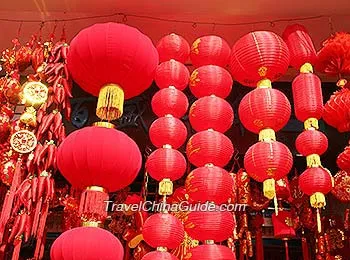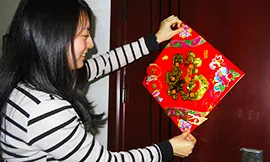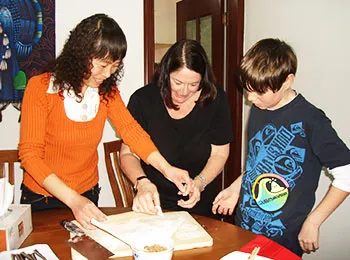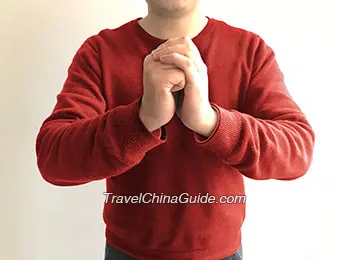A Full List – 21 Customs of Chinese New Year
During Chinese New Year, people have a long list of things to do. From one week preceding the festival to the 15th day after, many Chinese New Year customs are widely observed for thousands of years. The family reunion dinner, eating dumplings, and setting off firework are the must-dos that you might know. What else interesting do the Chinese do? The following 21 customs of Chinese New Year must be the list you are looking for.
1. Cleaning Up
 Cleaning the house is a long-observed Chinese New Year tradition. The ground, the walls, and every corner of the house need to be cleaned.
Cleaning the house is a long-observed Chinese New Year tradition. The ground, the walls, and every corner of the house need to be cleaned.
In Chinese, “Dust” is a homophone for the word “Chen", meaning the old. Therefore a year-end cleaning is needed to drive the old things or the bad luck away from the house, and get ready for a new start.
2. New Year Shopping
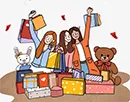 After cleaning people will go shopping, from a new piece of furniture to a new plate. Chinese people believe that since this is a year anew they should buy a lot of new things. Purchasing new items symbolizes welcoming new things and getting ready for a new start.
After cleaning people will go shopping, from a new piece of furniture to a new plate. Chinese people believe that since this is a year anew they should buy a lot of new things. Purchasing new items symbolizes welcoming new things and getting ready for a new start.
A variety of foods are sure in their shopping list. Meat, vegetables, fruits are must, while candies and nuts are popular items which are later seen on the tea table of every Chinese household.
3. Paste Spring Festival Couplets
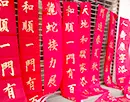 Couplets are typically pasted on doorways as a part of the festival's decoration. The custom of pasting Spring Festival couplets can be traced back over 1,000 years to the Later Shu State (934 - 965). The original form of modern couplets was called “Taofu”, a piece of peach wood protecting against evil without any writing on. In the Song Dynasty (960 - 1279), the antithetical couplets began to be written on the wood to express people's good wishes. Later, the modern form of couplets appeared replacing the peach wood with the red paper. The couplets include two veritcal scrolls on two sides and a horizontal scroll on the top.
Couplets are typically pasted on doorways as a part of the festival's decoration. The custom of pasting Spring Festival couplets can be traced back over 1,000 years to the Later Shu State (934 - 965). The original form of modern couplets was called “Taofu”, a piece of peach wood protecting against evil without any writing on. In the Song Dynasty (960 - 1279), the antithetical couplets began to be written on the wood to express people's good wishes. Later, the modern form of couplets appeared replacing the peach wood with the red paper. The couplets include two veritcal scrolls on two sides and a horizontal scroll on the top.
4. Paste the “Fu” Character
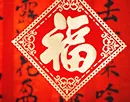 The character “Fu”, meaning good fortune or happiness, is used to express people's good wish and yearning for the future, so people usually paste it on the gates or some furniture in the house during the Chinese New Year. Pasting the “Fu” upside down, meaning the arrival of happiness or good fortune, is a widely accepted custom among Chinese people.
The character “Fu”, meaning good fortune or happiness, is used to express people's good wish and yearning for the future, so people usually paste it on the gates or some furniture in the house during the Chinese New Year. Pasting the “Fu” upside down, meaning the arrival of happiness or good fortune, is a widely accepted custom among Chinese people.
In ancient time, this character and the couplets were written by hand, but now, people can buy printed ones. Some shops even present these printed works to their customers.
5. Chinese Knots
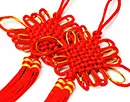 They are prepared to decorate houses during the festival. They were first used to string jade pendants on clothes as decorations and these knots were widely used as decorations on traditional Chinese musical instruments.
They are prepared to decorate houses during the festival. They were first used to string jade pendants on clothes as decorations and these knots were widely used as decorations on traditional Chinese musical instruments.
Now there are small Chinese knots used as gifts or curtain decorations, and also big ones as hanging ornaments in the house.
6. Paste Window Paper-Cuts
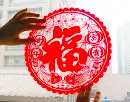 The time-honored handicraft of paper-cuts carries carries people’s good wishes. Auspicious words or patterns are cut on red paper, recording the happy moments in life or imagining the better life of the New Year.
The time-honored handicraft of paper-cuts carries carries people’s good wishes. Auspicious words or patterns are cut on red paper, recording the happy moments in life or imagining the better life of the New Year.
The paper-cuts of Fu character are the most popular pattern. People paste them on windows or furniture.
7. Door Gods Pictures
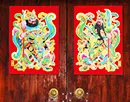 In Taoism and ancient folk custom, the Gods of the Door, are among the most popular gods for ancient Chinese people. They are in a pair, usually in the images of the deified generals of the Tang Dynasty (618 -907) – Qin Qiong and Yuchi Gong.
In Taoism and ancient folk custom, the Gods of the Door, are among the most popular gods for ancient Chinese people. They are in a pair, usually in the images of the deified generals of the Tang Dynasty (618 -907) – Qin Qiong and Yuchi Gong.
During the Chinese New Year, people paste their pictures on the doors to drive away the evil spirits, keep the house safe, and encourage the good fortune.
8. New Year Pictures
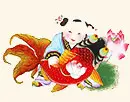 They originated from the Door Gods pictures in the Han Dynasty (202BC - 220AD), and became a popular activity since the Song Dynasty. The mature craft of woodblock carving at that time enabled people to make various life scenes alive, such as their harvest parties, worship formalities, and religious ceremonies.
They originated from the Door Gods pictures in the Han Dynasty (202BC - 220AD), and became a popular activity since the Song Dynasty. The mature craft of woodblock carving at that time enabled people to make various life scenes alive, such as their harvest parties, worship formalities, and religious ceremonies.
Later, more themes like women and babies, opera performance, and zodiac animal signs are included in the pictures.
9. Family Reunion Dinner
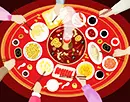 As the festival approaches, family reunion becomes the major concern of every Chinese. No matter how far apart of the family members, they would get back home for the biggest annual gathering. A luxurious home-made dinner is served, containing many dishes with not only delicious taste, but also good appearance and auspicious connotations. Besides the dumplings, a whole fish is a must, standing for a surplus and fortune of the New Year.
As the festival approaches, family reunion becomes the major concern of every Chinese. No matter how far apart of the family members, they would get back home for the biggest annual gathering. A luxurious home-made dinner is served, containing many dishes with not only delicious taste, but also good appearance and auspicious connotations. Besides the dumplings, a whole fish is a must, standing for a surplus and fortune of the New Year.![]() See Top 10 Lucky Dishes on Chinese New Year Dinner
See Top 10 Lucky Dishes on Chinese New Year Dinner
10. Eating Dumplings
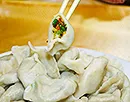 The most important food during Chinese New Year is the dumplings, which are made with flour and stuffed with different fillings. It is a custom to eat dumplings on the New Year’s Eve, the 1st and the 5th day of the New Year. Because their shape resembles the monetary ingots used in ancient times, dumplings are believed to bring wealth in the coming year. People wrap coins, candies, or peanuts in some of the dumplings to express different blessing, for example a coin for wealth, candy for sweet life, and peanuts for health and longevity.
The most important food during Chinese New Year is the dumplings, which are made with flour and stuffed with different fillings. It is a custom to eat dumplings on the New Year’s Eve, the 1st and the 5th day of the New Year. Because their shape resembles the monetary ingots used in ancient times, dumplings are believed to bring wealth in the coming year. People wrap coins, candies, or peanuts in some of the dumplings to express different blessing, for example a coin for wealth, candy for sweet life, and peanuts for health and longevity.![]() Learn to Make Dumplings
Learn to Make Dumplings
11. Glutimous Rice Balls
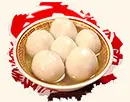 In south China, the Glutinous Rice Ball, Yuanxiao or Tangyuan in Chinese, is a traditional food for the Chinese New Year, just as the dumplings in north China. The balls are made of sticky rice flour stuffed with different fillings. Some do not have fillings. Their round shape symbolizes reunion, harmony and happiness. In north China, the Glutinous Rice Balls are eaten only on the Lantern Festival, when family members gather together and appreciate the first full moon of a lunar year.
In south China, the Glutinous Rice Ball, Yuanxiao or Tangyuan in Chinese, is a traditional food for the Chinese New Year, just as the dumplings in north China. The balls are made of sticky rice flour stuffed with different fillings. Some do not have fillings. Their round shape symbolizes reunion, harmony and happiness. In north China, the Glutinous Rice Balls are eaten only on the Lantern Festival, when family members gather together and appreciate the first full moon of a lunar year.
12. CCTV New Year's Gala
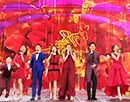 CCTV New Year's Gala is a comprehensive art and performance event on the festival's eve. First broadcasted in 1983, it has become a beloved performance including skits, cross talk, acrobatics, songs and dances.
CCTV New Year's Gala is a comprehensive art and performance event on the festival's eve. First broadcasted in 1983, it has become a beloved performance including skits, cross talk, acrobatics, songs and dances.
The gala starts at 20:00, with a countdown at 0:00, and ends with the song “Cannot Forget Tonight” at about 0:30.
13. Firecrackers and Fireworks
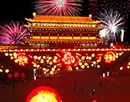 Firecrackers are always set off at midnight. In some places, people also set off firecrackers on the morning of the first day of the New Year. The use of firecrackers can be traced to the legend of the Monster Nian in 2,000 years ago, when people threw bamboo into the fire to drive away the monster. After gunpowder was invented, firecrackers replaced the bamboo. Because fires can be easily started by the firecrackers, many places ban firecrackers except in designated areas.
Firecrackers are always set off at midnight. In some places, people also set off firecrackers on the morning of the first day of the New Year. The use of firecrackers can be traced to the legend of the Monster Nian in 2,000 years ago, when people threw bamboo into the fire to drive away the monster. After gunpowder was invented, firecrackers replaced the bamboo. Because fires can be easily started by the firecrackers, many places ban firecrackers except in designated areas.
14. Send Greeting Messages
 During the festival and especially on the New Year’s Eve, people send greetings to relatives, colleagues, and friends through phone.
During the festival and especially on the New Year’s Eve, people send greetings to relatives, colleagues, and friends through phone.
They use instant messenger like Wechat, to send text and voice messages, emoticons, videos, and digital red envelopes to express good wishes.![]() Learn Chinese New Year Greetings
Learn Chinese New Year Greetings
15. Send Greeting Cards
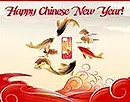 In the past, people sent New Year cards to their friends, parents, and relatives during the happy event especially when they were not going to be with them on the festival. Words of blessing are written on the cards similar to Christmas cards in western countries. Now, with the advance of technology, the form of cards has changed, while the custom of sending cards continues, with both paper cards and digital ones.
In the past, people sent New Year cards to their friends, parents, and relatives during the happy event especially when they were not going to be with them on the festival. Words of blessing are written on the cards similar to Christmas cards in western countries. Now, with the advance of technology, the form of cards has changed, while the custom of sending cards continues, with both paper cards and digital ones.![]() Send Free Greeting Cards
Send Free Greeting Cards
16. Give Red Envelopes
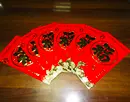 Red envelope, also known as lucky money, is prepared for children by the elderly and given after the reunion dinner. In folk culture, children will live safe and sound for the whole year if they get the lucky money. This custom still remains and the amount of money is increasing.
Red envelope, also known as lucky money, is prepared for children by the elderly and given after the reunion dinner. In folk culture, children will live safe and sound for the whole year if they get the lucky money. This custom still remains and the amount of money is increasing.
Children use the money to buy books or other school supplies. Some families save the money for the kids’ future use.
17. Wear New Clothes
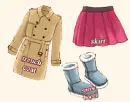 Chinese people prefer everything new for the festival. Generally it is the duty of the middle generation of a family to buy new clothes for all family members. Although some adults do not follow this custom any more, every child wear brand new clothes on the New Year’s Day, from head to toe.
Chinese people prefer everything new for the festival. Generally it is the duty of the middle generation of a family to buy new clothes for all family members. Although some adults do not follow this custom any more, every child wear brand new clothes on the New Year’s Day, from head to toe.
For people in his or her zodiac year of birth, a piece of new clothing in red is needed. Red underwear is popular, while a red overcoat is also a common choice.
18. Visit Friends and Relatives
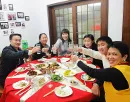 A special way for people to express good wishes to each other and an important Chinese New Year tradition is to visit relatives. Generally speaking, people drop in at relatives and friends' houses, bringing gifts or red envelopes, and greeting one another with 'Happy New Year'. In some rural places, where families have many relatives, this activity lasts for several days. It is impolite to visit someone without a gift. Therefore, special local products, fruits, and wines should be taken when you visit others.
A special way for people to express good wishes to each other and an important Chinese New Year tradition is to visit relatives. Generally speaking, people drop in at relatives and friends' houses, bringing gifts or red envelopes, and greeting one another with 'Happy New Year'. In some rural places, where families have many relatives, this activity lasts for several days. It is impolite to visit someone without a gift. Therefore, special local products, fruits, and wines should be taken when you visit others.![]() Read more about Gift Ideas
Read more about Gift Ideas
19. Temple Fairs
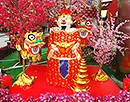 Temple fair is an old practice of Chinese New Year customs, especially in Beijing. Although they originally were a form of worship connected with temples, now they are more like carnivals and are sometimes held in parks. Traditional cultural performances such as playing diabolo, traditional magic, puppet shows and so on can be seen. Besides, people can buy all kinds of small commodities at very low prices. During and after the festival, Beijing has temple fairs almost every day in different places such as Wangfujing, Altar of the Earth and Longtan Park.
Temple fair is an old practice of Chinese New Year customs, especially in Beijing. Although they originally were a form of worship connected with temples, now they are more like carnivals and are sometimes held in parks. Traditional cultural performances such as playing diabolo, traditional magic, puppet shows and so on can be seen. Besides, people can buy all kinds of small commodities at very low prices. During and after the festival, Beijing has temple fairs almost every day in different places such as Wangfujing, Altar of the Earth and Longtan Park.
20. Watch Colorful Lanterns
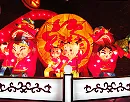 The Lantern Festival marks the end of the festival. Lanterns in different shapes are displayed on the evening of the 15th day of the 1st lunar month. In ancient times, these lanterns were made of paper or silk with candles placed inside. Now the materials have changed and the candles have replaced by bulbs or LEDs.
The Lantern Festival marks the end of the festival. Lanterns in different shapes are displayed on the evening of the 15th day of the 1st lunar month. In ancient times, these lanterns were made of paper or silk with candles placed inside. Now the materials have changed and the candles have replaced by bulbs or LEDs.
In many cities, there are lantern fairs held in some historical sites or landmark buildings, where visitors can enjoy the beauty of the traditional Chinese art.
21. Watch Shehuo Performance
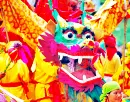 Shehuo is often part of the Lantern Festival particularly in north China. It is a form of worship consisting of both shows and parades, including a variety of performances such as the dragon and lion dances, yangko dance, and performance on stilts.
Shehuo is often part of the Lantern Festival particularly in north China. It is a form of worship consisting of both shows and parades, including a variety of performances such as the dragon and lion dances, yangko dance, and performance on stilts.
Shehuo is a common Chinese New Year custom in rural areas, but seldom seen in cities. In some small towns, people crowd the roads to watch the exciting parade on the 15th day of the 1st lunar month.
